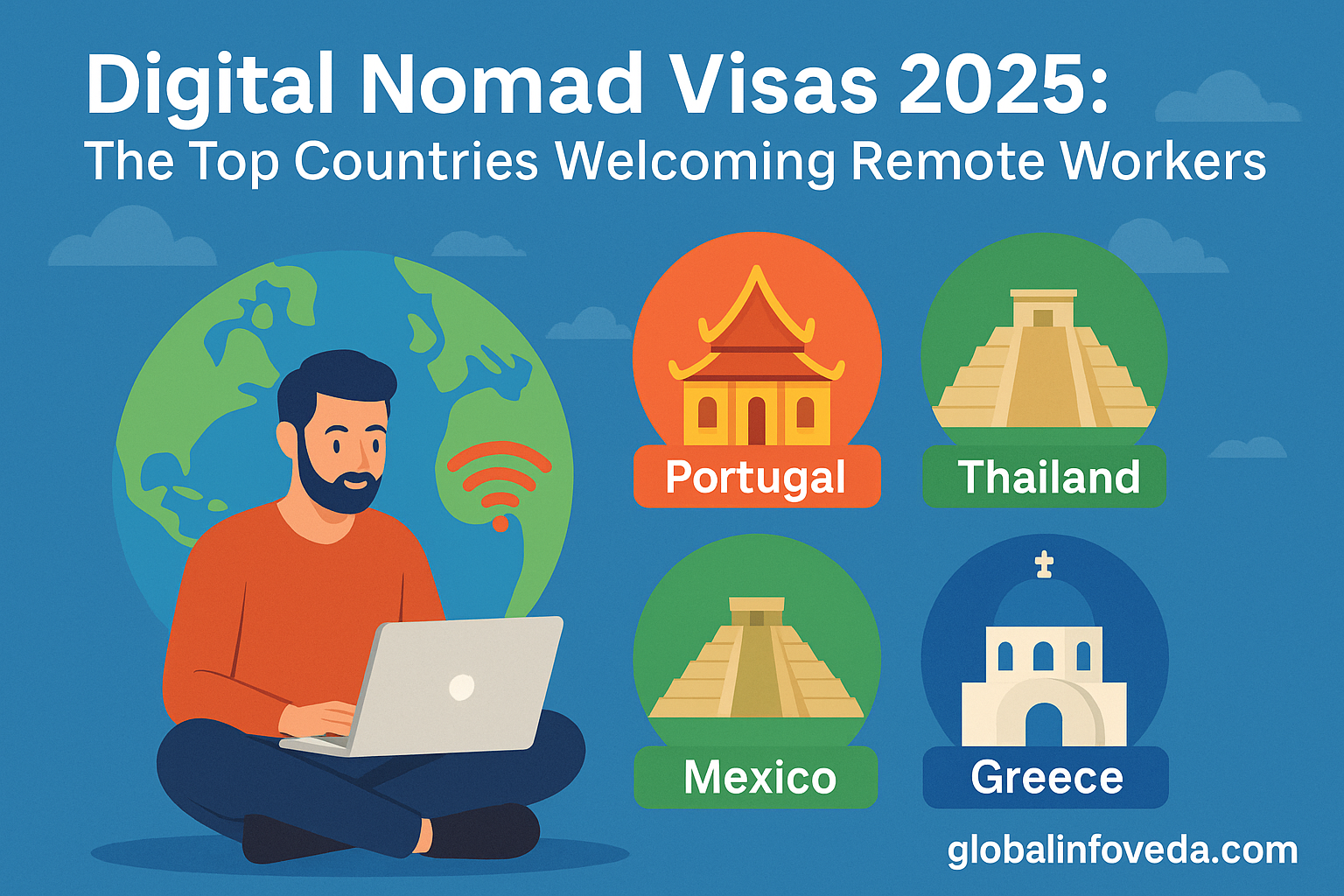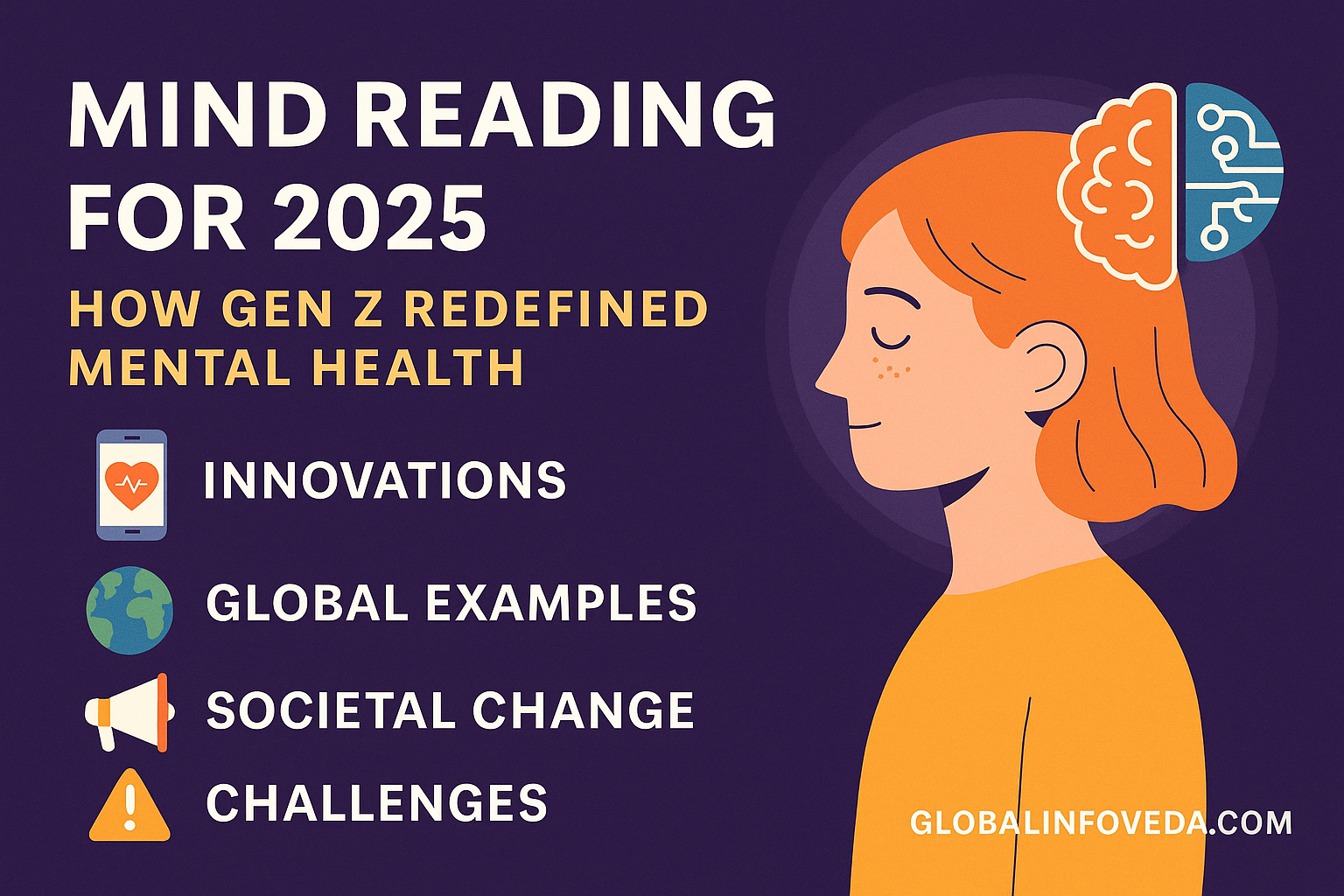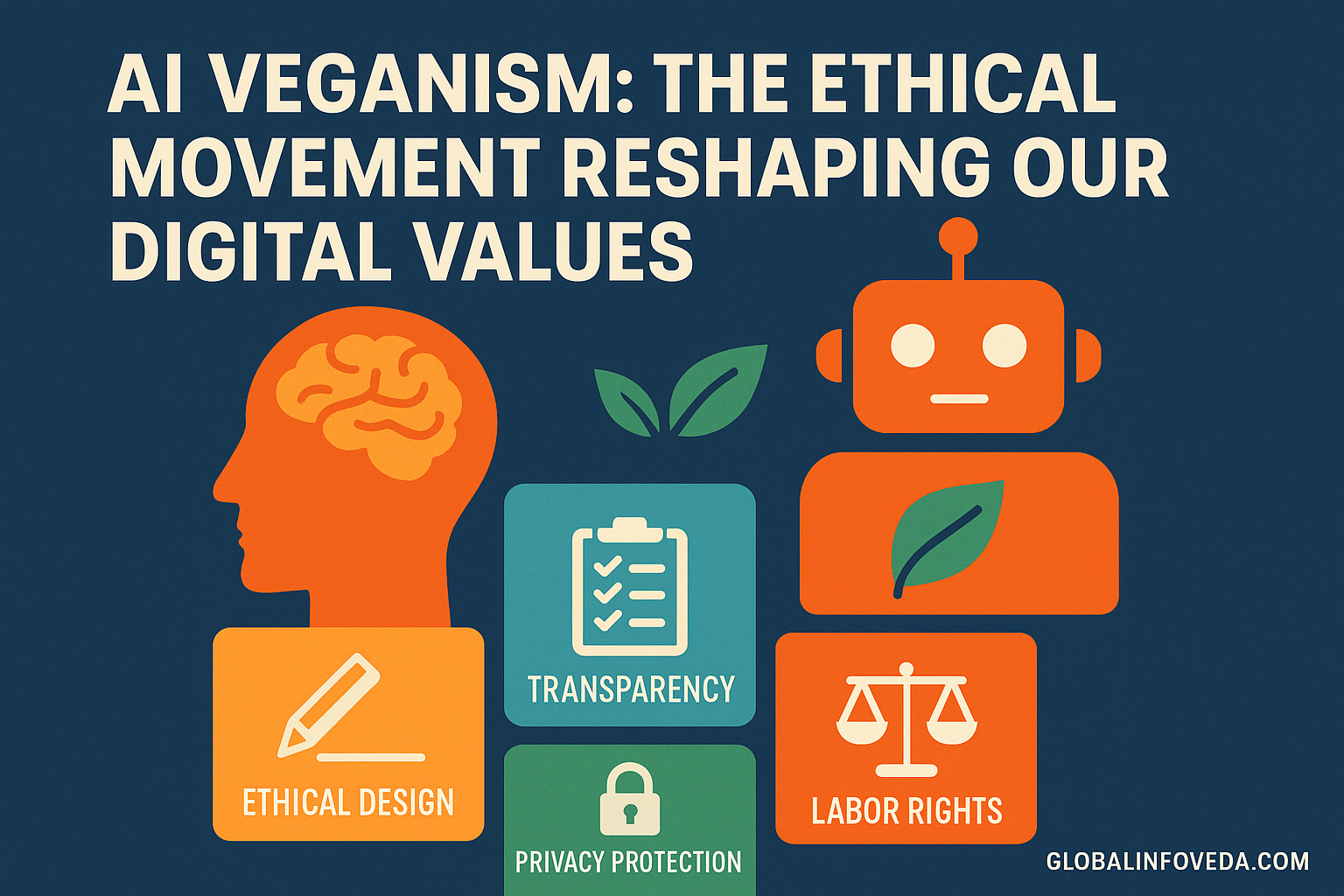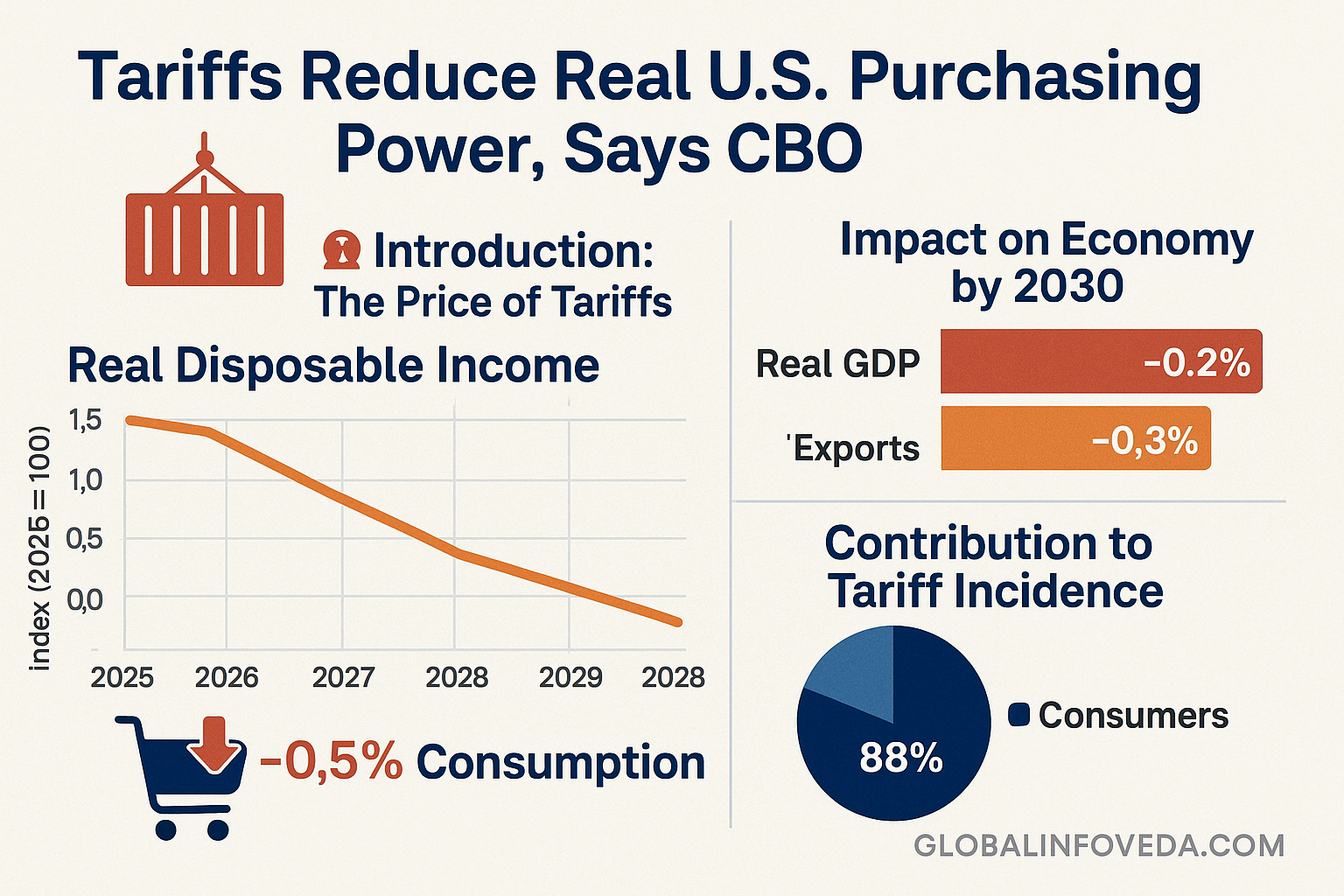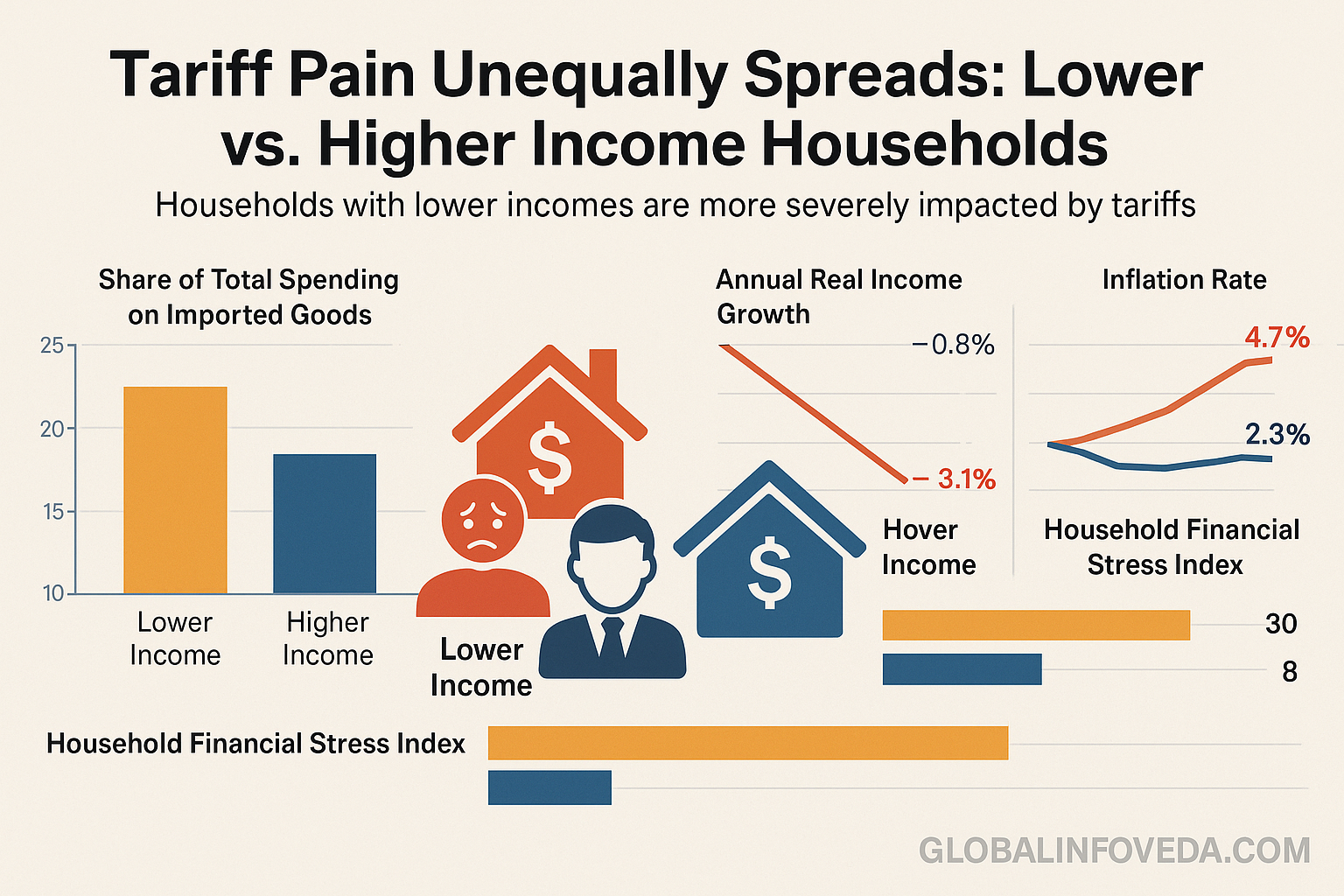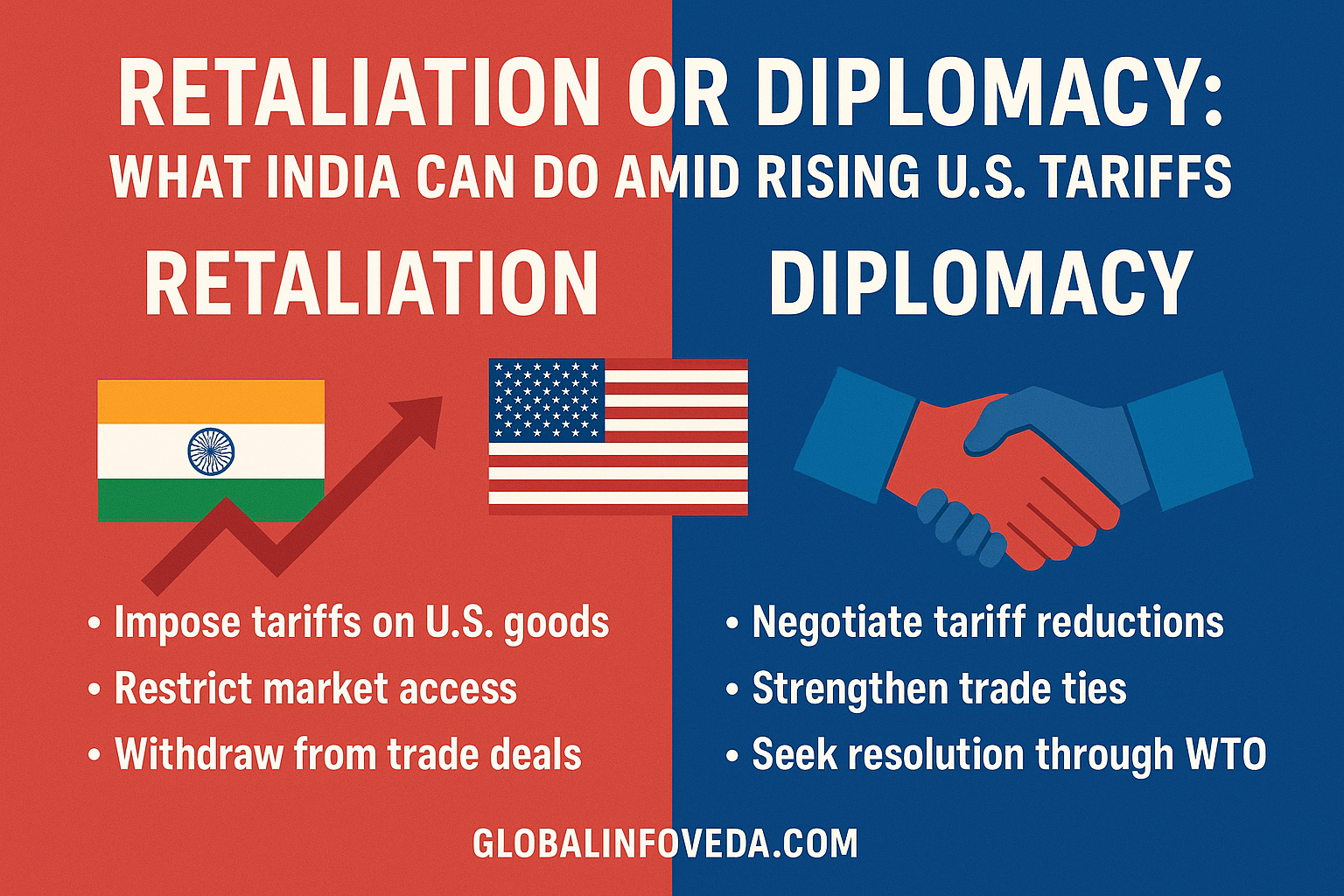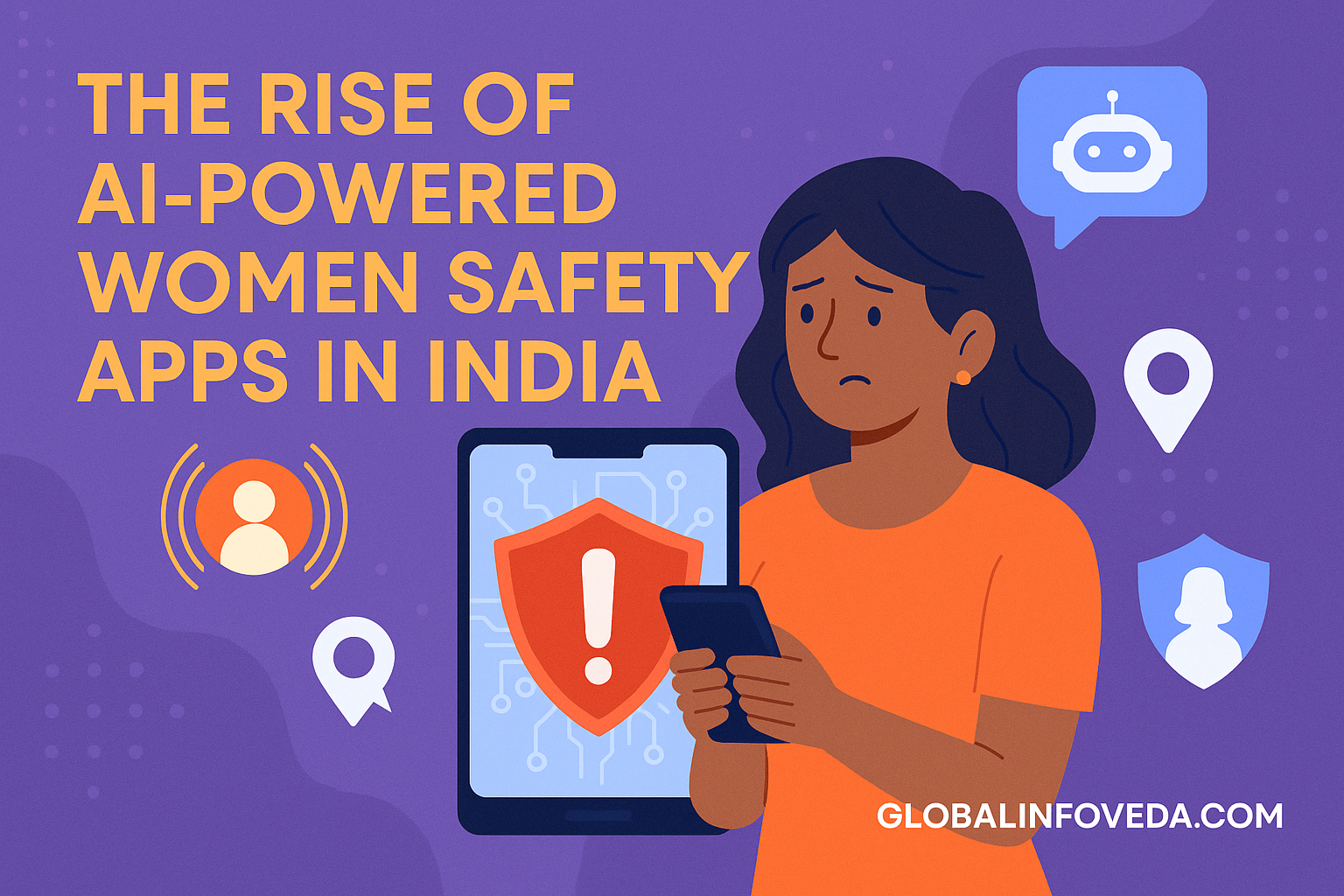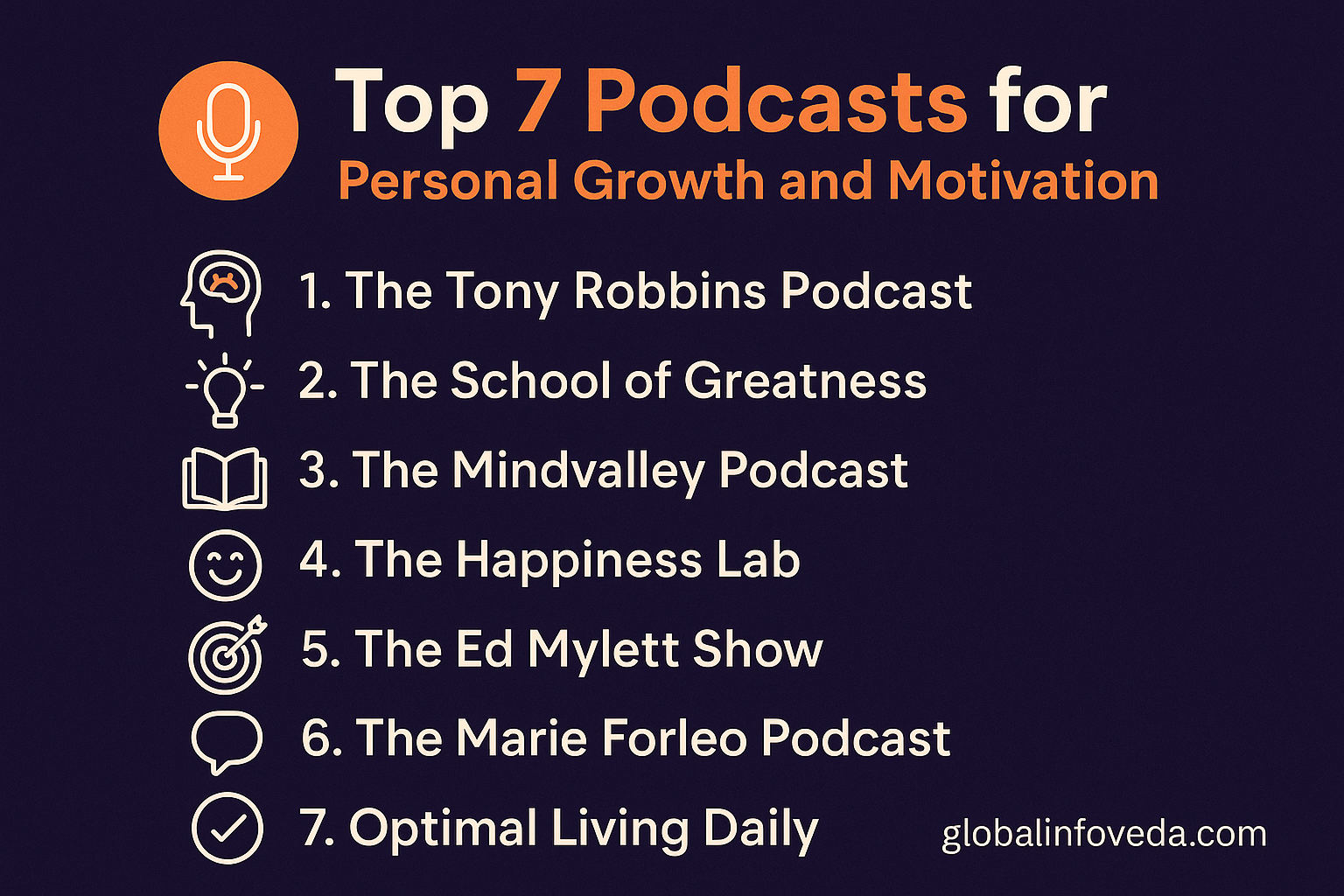🌍 Introduction
In 2025, pathways for digital nomad visas have shifted from novelty to mainstream, allowing remote workers to set roots abroad, coming from an employer or client outside the host country. The appeal to Indians and other global professionals is apparent: cost-and-living arbitrage, time-zone benefit, cultural assimilation, and usually cleaner paperwork than balancing tourist entries. But, success hinges upon knowing about visa length, minimum income, tax obligations, health cover and dependants—and aligning it with your work pattern, financial safety net and care responsibilities. In this deep dive, we will cover where digital nomad visas are hottest right now, what trade‑offs to be ready for, and how to design a bulletproof travel plan that secures your income, wellbeing, and company secrets, all while staying on the right side of immigration officers—and your customers.
Meta description: The 2025 guide to digital nomad visas—top countries, stay lengths, income thresholds, tax design, insurance, dependants, and playbooks for hassle‑free remote work.
🧭 Foundations you must grasp
There are three pillars around which the offerings of a digital nomad visa differ: eligibility, stay design, and tax stance; and the weight of these have a flow-on effect from rent budgets, down to school options for kids. The eligibility will combine minimum income level, proof of working remotely, and a clean background check; the stay design will detail the length of the visa, whether you can enter multiple times, and if your family can accompany you; and the tax stance will state whether you will be a tax resident, need to pay a flat tax, or will just pay local VAT on the actual consumption. As 2025 programmes are now focused predominately on mid‑ to high‑earning professionals, expect to see sharper proof standards (employment contracts, client invoices, bank statements), more stringent health insurance language, and more explicit statements around dependant schooling and private coverage. Consider the framework as a tripod: you weaken one leg and the whole plan becomes wobbly — excellent paperwork but grey taxes, or amazing taxes but short stays, or generous stays but impossible income levels.
✅ Quick selectors for different profiles
- 🧑💻 First‑time freelancer: seek digital nomad visa options with modest income requirement and multiple entry (e.g., Southeast Asia) while retaining home‑country tax filings.
- 👨👩👧 Family with school‑age kids: prioritise visa duration ≥ 12 months, clear dependant rules, and neighbourhoods with bilingual schools.
- 🧑🏫 Ed‑tech or teacher: look for friendly co‑working ecosystems and mid‑day time‑zone overlap with Indian and European clients.
- 🧑⚕️ Health‑conscious worker: ensure mandatory health insurance covers emergency evacuation and pre‑existing conditions.
- 🧮 Tax‑aware consultant: favour countries with explicit non‑resident tax carve‑outs or clear thresholds before tax residency applies.
Budget Travel Secrets: Explore India for Under ₹5000
🧠 What a host country is really offering
It remains open, not closed, and hosts can channel smart spenders with a digital nomad visa, keeping them long enough to soak up the local economy but never take a local job. For 2025, programmes focus on reliable broadband, e‑government portals, and co‑working density; secondary attractions are family‑friendly parks, walkable regional cores, and flight hubs. The dirty side of your agreement is neat obedience: pay the rent, pay your SIM cards, pay for health insurance, don’t overstay your visa. The biggest pitch is not scenery for the worker — it is execution: 12 quiet weeks to ship a product sprint, edit a doc, or write a book, under a roof with manageable distractions & high predictability in cost. Countries that get paperless onboarding right have exploded in popularity as a result; shorter queues, simpler income requirement guidelines, and immediacy fuel a positive feedback loop of consumer confidence and word‑of‑mouth.
🧭 Core decision matrix
| Factor | Why it matters | What to verify |
|---|---|---|
| Visa duration | Determines school terms, leases, equipment purchases | Exact months, renewal paths, exit‑reentry rules |
| Income requirement | Affects who qualifies and how volatile your cashflow can be | Monthly/annual net thresholds, documentation style |
| Tax stance | Impacts take‑home pay and filings | Non‑resident carve‑outs, flat regimes, social contributions |
🗺️ Regional roundup — Europe
Europe continues to be the most concentrated cluster for well-advanced digital nomad visa programs, valued for the connection location, public spaces and healthcare quality. In Estonia, for example, they emphasize a difference between a digital nomad visa and e‑Residency: the former means presence to work remotely from Estonia; the latter means you can run a company, without being present in residence. Iberian options—Portugal and Spain—are midway between lifestyle, fibre internet, and strong creative scenes; Spain paved the way under its startup law—processing improved from 2023–2025. Rapid speculation turned into reality inItaly with a decree spelling out entry via 2024 for remote workers who pass higher skills and earnings bars, connecting a Mediterranean option buttressed by extensive rail connections. Amicable coupling between pre-requirements; well balanced and steady performance for both off-shore destination will continue— income requirement, private insurance, accommodation. The great European trade‑off is price: cap rents and groceries only go so far unless you live beyond capitals, batch cook, and weigh shoulder‑season stays.
🧳 Regional roundup — Middle East & North Africa
So, Gulf hubs are courting the globally mobile professionals with the reliable flights and the modern infrastructural base. The UAE itself offers a long shot remote work visa with a one‑year entry point for those whose income comes from outside of the Emirates, an appealing halfway house for founders looking for investor nearness — without having to sink roots. Cost and craft scenes pull creatives ever to Morocco and Egypt but long‑stay frameworks differ by nationality and subsector, the clarity is improving though as of 2025 but you need to check that you’re in remote work and not local employment. Yes, climate matters—summer heat determines how families spend their days—so find homes near gyms and places for indoor play, and ask about utility caps in leases; the ideal arrangements include steady broadband, quiet rooms, and power backup.
🌴 Regional roundup — Asia Pacific
Asia Pacific matches beaches and megacities with an ever-growing smorgasbord of stays. Long Term Residence (LTR): Targeting high-potential personnel, with extended duration and tax benefits; for senior professionals or founders, aimed at senior skilled workers or business owners to invest in Thailand. Meanwhile in Malaysia, the DE Rantau program offers a specially catered permit to digital nomad visa holders in the tech and creative fields, along with an ecosystem of co‑working zones. A time‑bound digital nomad category also debuted by Japan in 2024, helpful for six‑month creative sprints if you can meet a higher income threshold and comprehensive insurance regulations. As for Indonesia — which combines its long-stay and “second-home” visa offerings — Bali continues to be hot primarily from a per-capita density of community and services standpoint, although precise regulatory details should be checked on official portals prior to making long-term leases. Australia and New Zealand emphasize the work/holiday and skilled pathways, they are fantastic for efforts and shooting, but straight digital nomad visa pathways are still small compared to Asia’s up-and-coming specialists.
🌎 Regional roundup — Americas
Diversity – from Caribbean islands to Southern Cone capitals – is found in the Americas. Costa Rica long‑stay remote remains popular for families; access to nature and friendly communities Mexico temporary residence route (not branded a digital nomad visa but used as such) offers flexible proof of funds. Colombia narrows the focus of its remote work permit to cater to tech and design talent as it continues to feed off of a co‑working boom in Medellín; Brazil bridges connections between startups and creatives throughout São Paulo, Rio, and Florianópolis. Canada plays around with remote‑first talent and startup channels, while U.S. lacks a classic digital nomad visa, although ESTA/B‑classes and treaty categories support short projects—be sure to check boundaries of lawful employment to avoid misclassification.
🧠 Budget architecture for a stable year abroad
Self-funded nomad year comes from 3 levers: housing, food and connectivity. Housing: 3–6 month rental lockouts beyond city cores with heat‑map commutes to co‑working; test water pressure and blackout curtains and pay for desk ergonomics Food: batch cook staple breakfasts and two dinners a week; your real leverage is reducing delivery fees, not radical diet changes. Connectivity: purchase a primary SIM with large-data in your own country and a secondary eSIM from an international provider; keep a travel router in your bag Now that you have a spending basic level, wrap all that into a security blanket defined as three months of income need so if Mrs. Muppet comes knocking, you can tell her to hit the road. Within that discipline, quarterly moves is a cadence, not a rescue mission.
🧰 Compliance toolkit for clean entries
- 📄 Proof stack: employment contract or client invoices, three months of bank statements, and past tax filings.
- 🧾 Insurance: global plan with emergency evacuation, maternity exclusions understood, and local clinic lists.
- 🏠 Address: lease with host ID, utility lines, and any city registration slips.
- 🧑💻 Work gear: surge‑protected adapters, webcam cover, privacy screen, and cable spares.
- 🧮 Money: multicurrency account, UPI + card combo, and low‑fee overseas ATM strategy.
Offbeat Escapes: Remote Destinations Replacing Overcrowded Hotspots
🧭 Europe — where rules shine
| Country | Stay design | Notable threshold |
|---|---|---|
| Estonia | 12 months; clear digital nomad visa distinct from e‑Residency | Income ≈ €4,500 net/month (check latest line) |
| Spain | Multi‑year paths under startup framework; good family joins | Income bands scale with dependants |
| Italy | Skilled remote workers admitted under 2024 decree; clear employer/self‑employed proofs | Higher earnings + private health insurance |
🧭 Asia Pacific — flexibility and focus
| Country | Stay design | Notable threshold |
|---|---|---|
| Thailand | LTR with up to 10‑year validity for defined talent cohorts | Salary/investment criteria; tax advantages |
| Malaysia | DE Rantau promotes tech/creative remote work with co‑working support | Income floors; programme zones |
| Japan | Six‑month digital nomad route; re‑application after exit | High annual income; robust insurance proofs |
🧭 Middle East — fast hubs
| Country | Stay design | Notable threshold |
|---|---|---|
| UAE | One‑year remote work programme; strong air links | Salary proof; family sponsorship options |
| Jordan | Entrepreneur/remote pathways evolving | Check ministry bulletins |
| Oman | Investor and professional tracks | Verify sector eligibility |
🧠 Taxes without tears
No — Just because you get your digital nomad visa in the order of running away from taxes does not mean you were successful. If you spend less than that many days in a country (generally 183 days, but it varies), then you cannot become a tax resident there, but where a company is formed, permanent establishment risk, and double taxation agreements will still apply. Some hosts impose benign regimes, e.g., flat tax or exemption of income from abroad, to other, a simple right of stay only, no special tax relief. Craft a calendar around your residency time, both in the host country and in your home country, then keep a record of your centre of vital interests (property leases, family location, voter rolls). Keep your local paperwork tidy and get professional advice if you sell into the host market as moving from “foreign-sourced consulting” to “local retail” can change your filings overnight.
🧪 Case study — Bengaluru UX designer in Tallinn
With clients in Europe, a Bengaluru freelancer getting paid in USD decided the time is right to live in Estonia (and applied for a 12‑month digital nomad visa) She recorded all income above the minimum, purchased RI insurance, and joined a coٔ‑work by Balti Jaama Turg. Merits: 2-3 hour flights in Europe, overlapping time zones, and well used public commons. Compromises: winter time zone, expensive groceries, and necessity to differentiate between e‑Residency e.g. for company running and digital nomad visa for physically spending time. This led to a structured release cycle with face-to-face workshops once every two quarters and an average tax footprint of modest size administered by means of treaties and day-count limitations.
🧰 Family playbook for moving with kids
- 🧒 Schooling: shortlist bilingual schools and ask for mid‑term entry policies; align visa duration with school terms.
- 🩺 Healthcare: map paediatric clinics and ERs; ensure health insurance includes vaccines and emergency dental.
- 🏠 Housing: prefer ground‑floor or lift buildings; confirm noise norms and stroller space.
- 🧸 Community: co‑ops and makerspaces can substitute for cousins; schedule hobby days to anchor routine.
- 🛂 Documents: minor‑travel consent letters, birth certificates, and extra passport photos.
Digital Detox Retreats: Escaping the AI Overload
🧠 Risk controls that keep trips smooth
- 🔌 Power: carry a compact UPS for routers to survive brief outages during calls.
- 🌐 Connectivity: dual‑SIM strategy, eSIM backups, and a travel router with captive‑portal bypass.
- 🧱 Landlord sanity: insist on written handovers for appliances and deposit terms; photo every meter.
- 🧾 Audit trail: keep receipts for rent and utilities; immigration reviews love clean stacks.
- 🧑⚖️ Scope clarity: remember you’re authorised for remote work for an external employer/client; local paid gigs can breach rules.
🧭 Choosing your first base — a four‑filter method
| Filter | Use | Example |
|---|---|---|
| Budget fit | Align rent and groceries with current cashflow | Secondary cities, shoulder seasons |
| Clock overlap | Keep client calls humane | India↔EU or India↔SEA corridors |
| Community | Join niches that match your craft | Photo, code, language clubs |
| Compliance | Minimise ambiguity and paperwork | Clear income requirement, clean renewals |
🇪🇪 Estonia — clarity and civic tech
The key to their success is that Estonia has divided its short‑term (C) and long‑term (D) digital nomad visa in a separate category from the e‑Residency, and the government portal explains the difference in the layman’s language. The programme is designed around a defined income requirement to appeal to remote employees and freelancers, includes up to 12 months stay and has several entry allowances that facilitate Schengen travel and client work. Advantages: speedy internet, well-maintained services, a culture that values deep-work Caveats: winter, rental competition in Tallinn, and if traveling elsewhere, the Schengen days tracking (Autumn 2022). Keep in mind that e‑Residency does not mean a place to stay if you run a company through it — your digital nomad visa is a physical-key that opens a presence door.
🇪🇸 Spain — creative gravity, practical documents
The map framework in Spain under its startup law has become a draw for designers, developers, and language teachers, looking for sunshine and infrastructure. Income requirement tiers by dependant level, police clearance and private health insurance are all expected. Increasingly, families have traded sand for stress and are now finding sunshine centres in Valencia and Málaga, blending the benefits of a bilingual education and an abundance of parks. Whether you use it for six-month contracts or just the occasional visit during weeks at off-peak times, use it to avoid paying too much; rents vary so much between postcodes. Non‑resident or favourable regime taxes only apply to those living in the jurisdiction for a specific time; confirm with local counsel, as the mechanics vary by profile and length of stay.
🇮🇹 Italy — decree to reality
Earlier this year, Italy finally actioned that digital nomad route by establishing a process open to digital nomads providing proof of higher skills, earnings and comprehensive health coverage by early 2024. But then again there are also world-class rail, food and creative networks. The drawbacks: the apartment turnover is slower in historic centres and the paperwork is distributed between police, communes, and consulates. Build in a buffer week to finish entries their own pace. Family friendly, mid-sized cities with parks and inexpensive trams Families will enjoy mid-sized cities boasting parks and low-cost trams; freelancers need to plan for a co-working or library membership in the service of prepetition, climate-controlled workspace in summer.
🇦🇪 United Arab Emirates — one‑year runway
The UAE remote work visa offers a one‑year base with direct access to India, Europe, and Africa, English‑friendly services, and a high level of safety. Look out for salary proofs, International health insurance, and bringing family under sponsorships. Affordable is the name of the game from both a quality of life perspective as well as for your apartment amenities and even business services, the broadband quality is great too although just know you will pay for cooling and transport. Most would have a base in Dubai, or perhaps Abu Dhabi, and make quarterly trips to the lower‑cost regions; the hub effect means clients can come to you too.
🇲🇾 Malaysia — DE Rantau ecosystem
DE Rantau by Malaysia: Penang, KL, and Langkawi unite the tech and creative remote-working community The programme provides not only permission to live and work remotely but also direction for co‑working spaces and events, and authorities broadened eligibility in 2024 to get a larger talent base. Cheaper than most Western capitals, fantastic food and good broadband if you are in programme areas. Since when did parks and malls with child‑friendly corners be sought after by families; Penang’s waterfront loops by cyclists? Make definite the ground on income and that your insurance is accepted.
🇹🇭 Thailand — long arcs for seniors and specialists
Particularly, Thailand’s Long-Term Resident (LTR) visa targets four distinct groups — the global wealthy citizen, the retiree, the highly skilled professional, and the executive — at up to ten years and with a tax benefit. Those credentials aside, Thailand does still work on conventional digital nomad visas for the non-classic examples, but the clarity and concierge‑style process are a draw for experienced execs and founders who can prove minimums on investment or salaries. Bangkok’s public transport, Chiang Mai’s maker scene and island fibre combine to make a broad fabric; the catch is avoiding the heat and retaining (policy) currency.
🇯🇵 Japan — focused six‑month sprints
And lastly, Japan launched a digital nomad option in 2024 under “designated activities”, allowing nationals from those countries who meet a high income threshold and who have the appropriate health insurance to work remotely for 180 days. This window is ideal for a heads‑down product push for creatives and engineers or a documentary edit utilizing gear stores and studios. Schools, transport and clinics are excellent; rentals need some planning and in many cases a guarantor😉. Pay attention to work‑scope rules: you can work for your foreign employer or clients, not hold local jobs.
🧠 Cost bands and where they shine
| Band | Examples | Notes |
|---|---|---|
| Value | Malaysia, parts of Mexico, Georgia | Lower rents, great food, growing co‑working |
| Balanced | Spain secondary cities, Portugal beyond Lisbon | Good fibre, walkability, parks |
| Premium | Japan, UAE, Western Europe capitals | Best transit and safety; budget carefully |
🧰 Health and safety practices that travel well
- 🏥 Insurance literacy: understand deductibles, exclusions, and claims flow; photograph policy cards.
- 🧫 Clinics map: pin urgent care and ERs near home and co‑working; save taxi numbers.
- 🧯 Home checks: smoke alarms, CO detectors in cold climates, and fire exits.
- 🥗 Food hygiene: choose crowded stalls with turnover; carry ORS and a small med kit.
- 🧘 Work hygiene: rotate between standing and sitting; eye‑level screens; scheduled breaks.
Budget Travel 2025: Best Offbeat Indian Destinations Under ₹5000
🧠 Paperwork tempo that reduces stress
- 📆 Backward planning: count consulate appointment lead times and biometrics windows; leave slack for police clearance.
- 📨 Version control: save PDFs of every submission; rename with date and country; keep offline copies.
- 🧾 Bank hygiene: keep three months of statements with consistent balances that meet the income requirement.
- 👜 Exit strategy: refundable flights or low‑change tickets for day‑count pivots.
- 🧑⚖️ Local counsel: one paid hour to confirm tax stance beats guesswork.
🧭 Seasonal strategy — live like a quarterly company
Segment your route into 90‑day chunks that mirror the work sprints. Q1: low-cost base to ship new featureQ2: culturally-rich hub to pitch/networkQ3: cooler climate for deep focusQ4: near family for festivals + recovery This cadence also resets visa allowances and tax residency clocks. Monitor energy and adapt: route south during winter if it sucks you dry; head for alpine or coast towns if summer heat impairs sleep. Monthly retrospectives on expenses, sleep, and production are more effective at sharpening choices than any influencer list.
🧪 Case study — Chennai product manager’s Asia loop
A remote PM working INR + USD bonus income rotated Malaysia (DE Rantau) → Japan (six‑month window) → Thailand (LTR family tie) He encapsulated school calendars for kids with time zones for clients, invested in a top-tier Circle K-type global health insurance plan and carried a UPS for modem emergencies in his pocket. The family offered clear refund identifies for a side craft retailer, retained tax filings up to date in India, and prevented local learnership. More weeks of focus than at home, better savings than a euro arc, kids who knew the basics of Japanese by month four?
🧰 Work systems that prevent burnout
- ⏱️ Meeting windows: restrict calls to two slots per day; force async for the rest.
- 🧘 Deep‑work ritual: same desk layout in every city; one playlist and one scent anchor.
- 💤 Sleep respect: blackout curtains, earplugs, and AC timers; no screens after 10pm.
- 🧾 Shutdown script: end the day by logging three wins and tomorrow’s top two tasks.
- 🧑🤝🧑 Social care: plan two friend calls per week to keep loneliness low.
Timeless Gwalior: Investing in Culture‑Centric Tourism Development
❓ FAQs
- Can I freelance for local clients under a digital nomad visa? In most cases, no—that crosses into local employment. Stick to foreign‑sourced income unless your permit explicitly allows otherwise.
- Do I owe tax if my income is foreign‑sourced? Possibly. Day counts, treaty rules, and centre of vital interests matter. Keep a residency calendar and ask a professional once per country.
- What about health insurance? Nearly all programmes require proof. Choose a plan with emergency evacuation and hospital cash benefits.
- How do I move with pets? Check airline and host import rules early; many require microchips, rabies shots, and waiting periods.
- Can I bring parents as dependants? Some programmes allow spouse/children only. Verify before signing a lease.
📚 Sources
- Estonia — Government portal distinguishing digital nomad visa and e‑Residency: https://www.e-resident.gov.ee/nomadvisa/
- Japan — MOFA page for the six‑month digital nomad category: https://www.mofa.go.jp/ca/fna/pagewe_000001_00046.html
- UAE — Official federal page on remote work residence: https://u.ae/en/archived-content/residence-visa/remote-work-visas
- Malaysia — MDEC’s DE Rantau programme overview: https://mdec.my/derantau
🧠 Final insights
In 2025, there is a smarter way to wield a digital nomad visa: Think like an operations manager (not a tourist), plot income requirement versus burn rate, ascertain tax posture via day‑count discipline, purchase strong health insurance, and select hubs where your craft community is already meeting face to face. If you then add quarterly cadence, dual-SIM redundancy, finders keepers transparent refund policies for any side hustle you’ve got on the go, and a bias towards written checklists, what you’ll end up with in a tin is cashflow and calm protection while actually making the most of the parks, galleries, hikes, cafés you crossed borders to find in the first place.
👉 Explore more insights at GlobalInfoVeda.com








